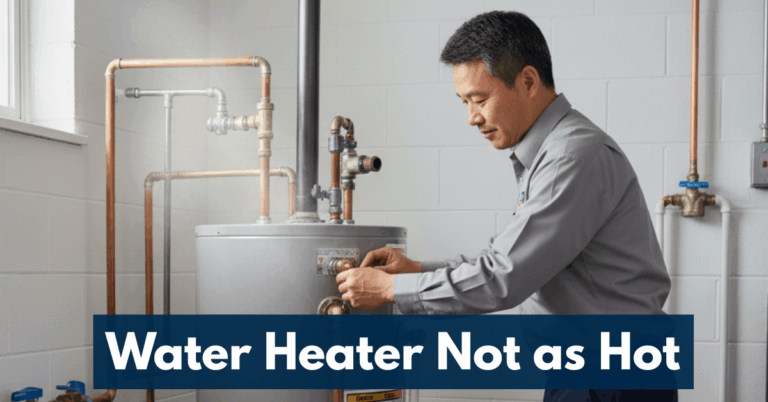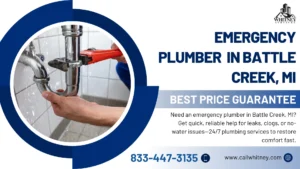If your water heater is not as hot as it used to be, it can disrupt your daily comfort — from lukewarm showers to ineffective dishwashing. Whether you have a tank or tankless unit, hot water efficiency plays a major role in your home’s comfort and energy costs. Understanding why your water heater isn’t performing properly can help you fix the problem before it becomes costly.
At Whitney Services, we help homeowners across Michigan and Florida restore, maintain, and optimize their water heaters for peak performance. Let’s explore why your water heater isn’t heating properly — and how to make it work efficiently again.
Common Reasons Why Your Water Heater Is Not as Hot
When you notice your water heater not as hot as it once was, there could be several underlying issues. Let’s go through the most common ones:
1. Sediment Buildup Inside the Tank
Minerals from hard water, such as calcium and magnesium, eventually sink to the bottom of your water heater tank. This buildup acts as insulation between the burner and the water, forcing the heater to work harder while producing less heat.
Solution: Flushing the tank at least once a year removes sediment and restores heating efficiency.
2. Thermostat Settings Are Too Low
Incorrect thermostat settings can sometimes be the problem. For efficiency and safety, the majority of water heaters are adjusted to about 120°F. However, if your thermostat is set lower or has become faulty, your water may never reach the desired temperature.
Solution: Check and adjust the thermostat setting. If it still doesn’t get hot enough, the thermostat may need replacement.
3. Heating Element Failure (Electric Water Heaters)
If you have an electric water heater, it relies on one or two heating elements. When one of them burns out, your system can only heat a limited amount of water.
Solution: A professional technician from Whitney Services can easily test and replace faulty elements to restore consistent hot water.
4. Gas Supply Problems (Gas Water Heaters)
Gas water heaters depend on a steady gas supply and a functioning burner. A clogged burner or faulty gas control valve can cause inconsistent water temperatures.
Solution: Check that your gas line is open and the pilot light is lit. If the burner appears dirty or the flame is yellow instead of blue, schedule maintenance right away.
5. Dip Tube Damage
To heat the water, the dip tube forces cold water to the tank’s bottom. If this tube cracks or breaks, incoming cold water mixes directly with hot water, resulting in lukewarm temperatures.
Solution: Replacing the dip tube is a simple and inexpensive repair that can make a major difference.
6. Aging Water Heater
Most water heaters last between 8–12 years. As they age, efficiency naturally decreases due to wear and corrosion. If your unit is nearing the end of its lifespan, replacement might be more cost-effective than repeated repairs.
Solution: If your water heater is over a decade old and performance keeps dropping, talk to Whitney Services about energy-efficient replacement options.
7. Cold Weather Conditions
In colder months, your water heater has to work harder to warm the incoming water supply, which can make it seem like your water heater is not as hot.
Solution: Insulate your water heater tank and the hot water pipes to help retain heat and improve efficiency.
How to Improve Hot Water Efficiency
Improving your water heater’s performance doesn’t always require a full replacement. These practical tips can help you enhance hot water efficiency and extend the lifespan of your system.
1. Flush the Tank Regularly
Flushing the tank every 6–12 months prevents sediment buildup, which is one of the leading causes of heating inefficiency. This simple maintenance step keeps the heating element or burner clean and effective.
2. Insulate Your Water Heater and Pipes
A well-insulated tank and pipes minimize heat loss, helping water stay hotter longer. This also reduces how frequently your heater must cycle, saving energy and money.
3. Check the Anode Rod
The anode rod protects your tank from rust and corrosion. When it wears out, the tank begins to deteriorate from the inside, reducing heating capacity.
Tip: Have your anode rod inspected every two years and replaced when necessary.
4. Install Low-Flow Fixtures
Using low-flow showerheads and faucets reduces the volume of hot water you use without sacrificing pressure, ensuring your system maintains comfortable temperatures for longer periods.
5. Adjust the Thermostat Smartly
Keeping your water heater set around 120°F strikes a good balance between comfort, energy efficiency, and safety. Increasing it slightly during winter can help maintain desired warmth, but avoid going over 140°F to prevent scalding.
6. Schedule Professional Maintenance
Just like HVAC systems, water heaters benefit greatly from annual professional tune-ups. A licensed technician from Whitney Services can inspect your system, flush the tank, test components, and ensure optimal performance.
Should You Repair or Replace Your Water Heater?
When your water heater is not as hot, it’s natural to wonder whether to repair it or replace it altogether. Here’s a quick guide:
Condition | Recommended Action |
Less than 7 years old | Repair – usually worth fixing |
Minor issues (thermostat, element) | Repair |
Frequent temperature drops | Inspect for sediment or dip tube damage |
Over 10 years old | Consider replacement |
Rusty water or leaks | Replace immediately |
Whitney Services offers both expert repair and installation services. We help you make the right decision based on your system’s age, performance, and budget.
Energy-Efficient Alternatives to Consider
If it’s time for a replacement, upgrading to a more efficient system can significantly reduce energy bills and improve hot water delivery.
1. Tankless Water Heaters
These systems heat water on demand, providing endless hot water while using less energy. They are compact, reliable, and perfect for energy-conscious homeowners.
2. Heat Pump Water Heaters
These models use electricity to transfer heat instead of generating it directly, making them two to three times more energy-efficient than conventional units.
3. High-Efficiency Gas Water Heaters
Modern gas units with advanced burners and insulation can greatly improve heating speed and efficiency.
Why Choose Whitney Services for Water Heater Solutions?
At Whitney Services, we specialize in diagnosing and fixing all types of water heater not as hot problems — from thermostat issues to complete system replacements.
Here’s why Florida and Michigan homeowners rely on us:
- Certified Technicians: Experienced professionals skilled in gas, electric, and tankless water heater systems.
- Comprehensive Services: Repair, replacement, maintenance, and installation.
- Energy Efficiency Experts: We focus on long-term solutions that improve performance and reduce utility costs.
- Fast Response: We understand the inconvenience of lukewarm water, so we respond quickly to restore your comfort.
- Customer Satisfaction Guarantee: Every service we provide is backed by reliable workmanship and transparent pricing.
Preventive Tips to Avoid Future Hot Water Issues
- Flush your tank annually to prevent sediment buildup.
- Inspect the anode rod every 2–3 years.
- Insulate the heater and pipes for better energy retention.
- Monitor water pressure to prevent stress on the system.
- Schedule routine maintenance with Whitney Services to catch problems early.
Conclusion
If your water heater is not as hot as it used to be, it’s often a sign of buildup, wear, or a simple adjustment issue. By following the maintenance tips above — or calling in the professionals at Whitney Services — you can restore comfort, extend your system’s lifespan, and lower your energy bills.
Don’t wait until your warm showers turn cold — contact Whitney Services today to schedule expert water heater inspection, repair, or replacement services.
Frequently Asked Questions
This is usually caused by sediment buildup, a faulty thermostat, or a failing heating element. Older units may also lose efficiency over time.
It’s recommended to flush your tank every 6 to 12 months to prevent sediment buildup and improve performance.
Keep your thermostat at around 120°F for optimal balance between efficiency, comfort, and safety.
Yes. During winter, incoming water is much colder, so your heater takes longer to reach the set temperature. Insulating the tank helps maintain heat.
If your unit is over 10 years old, produces rusty water, or constantly delivers lukewarm water, replacement is likely the best option.







